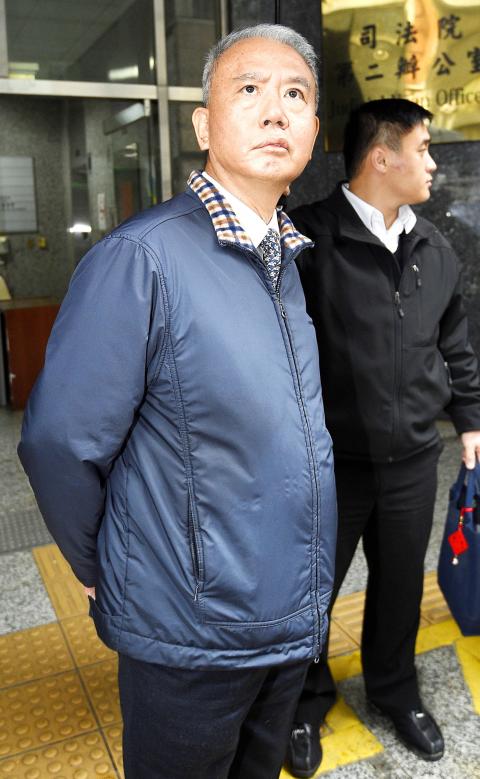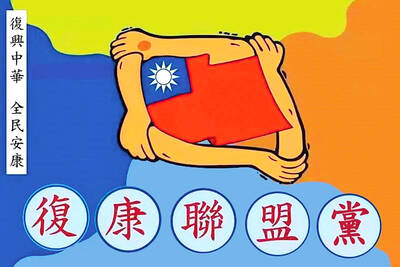Senior Ting Hsin International Group (頂新集團) executive Wei Ying-chun (魏應充) was found guilty of defrauding consumers and breaching food safety laws and given a four-year jail term by the Taipei District Court in a first-round ruling yesterday.
The court also ordered Wei Chuan Foods Corp (味全食品), a subsidiary of Ting Hsin, to pay a NT$15.5 million (US$473,051) fine, while Wei Chuan Foods general manager Chang Chiao-hua (張教華) was found not guilty.
Chang was the only one of 13 defendants to escape punishment, with 11 other company employees, excluding Wei, found guilty and sentenced to prison terms ranging from five months to 46 months, most of which can be commuted to fines.

Photo: Chen Chih-chu, Taipei Times
Wei’s lawyer Yu Ming-hsien (余明賢) said they would appeal his sentence.
“We regret this ruling and we cannot accept it... We believe Wei Chuan employees undertook their work by following the rules and did not break the law. We will appeal the ruling to fight for not-guilty rulings for Wei Chuan employees,” Yu said.
Legal professionals said Wei and his company got off lightly.
Lawyer Lin Chun-feng (林俊峰), a former prosecutor, said the court handed down light sentences to both Wei and Wei Chuan Foods for fraud and adulterating food products, which harmed people’s health.
Prosecution of the 2014 case involving tainted cooking oil was divided into two judicial cases, with yesterday’s ruling dealing with the firm’s plant-based oil products, while the Changhua District Court handled the case dealing with animal-based oil products.
The Changhua District Court’s not-guilty verdict handed down to Wei and five other defendants in November last year caused a public furor, while prosecutors have appealed that case to the Taiwan High Court.
Yesterday’s ruling said Wei Chuan Foods made illicit profits estimated at NT$209.73 million by mixing low-grade palm oil and other low-cost oils containing artificial coloring from supplier Chang Chi Foodstuff Factory Co (大統長基), and after processing, marketed the products as high-grade olive oil and other expensive cooking oils.
Among the four Wei brothers who owned and managed Ting Hsin Group, Wei Ying-chun is the main figure embroiled in the scandal, as he headed the group’s food and oil product subsidiaries, having served as chairman of Wei Chuan Foods, Ting Hsin Oil and Fat Industrial Co (頂新製油實業) and Cheng I Food Co (正義股份).
Wei and 11 other defendants were found guilty of fraud, faking product labels and breaches of the Act Governing Food Safety and Sanitation (食品安全衛生管理法), according to yesterday’s ruling.
Among them: former Ting Hsin Oil and Fat general manager Chang Mei-femg (常梅峰) was handed a 46-month term; Chung Mei-yu (鍾美玉), former head of Wei Chuan’s research center, was sentenced to 22 months; Shih Chieh-jen (施介人), manager of Wei Chuan’s food and oil product research and development division, was given 27 months; and Chen Jung-hui (陳榮輝), deputy head of the company’s product testing and analysis division, was senteced to five months.
Wei Chuan Foods said it regretted the Taipei District Court’s ruling against the company and its employees.
“We will immediately seek to appeal the ruling made by the court and will file a lawsuit against Ting Hsin Oil and Fat Industrial Co to seek compensation,” the company said in a statement.
Additional reporting by Aileen Chuang

AIR DEFENSE: The Norwegian missile system has proved highly effective in Ukraine in its war against Russia, and the US has recommended it for Taiwan, an expert said The Norwegian Advanced Surface-to-Air Missile Systems (NASAMS) Taiwan ordered from the US would be installed in strategically important positions in Taipei and New Taipei City to guard the region, the Ministry of National Defense said in statement yesterday. The air defense system would be deployed in Taipei’s Songshan District (松山) and New Taipei City’s Tamsui District (淡水), the ministry said, adding that the systems could be delivered as soon as the end of this year. The US Defense Security Cooperation Agency has previously said that three NASAMS would be sold to Taiwan. The weapons are part of the 17th US arms sale to

SERIOUS ALLEGATIONS: The suspects formed spy networks and paramilitary groups to kill government officials during a possible Chinese invasion, prosecutors said Prosecutors have indicted seven retired military officers, members of the Rehabilitation Alliance Party, for allegedly obtaining funds from China, and forming paramilitary groups and assassination squads in Taiwan to collaborate with Chinese troops in a possible war. The suspects contravened the National Security Act (國家安全法) by taking photos and drawing maps of key radar stations, missile installations and the American Institute in Taiwan’s headquarters in Taipei, prosecutors said. They allegedly prepared to collaborate with China during a possible invasion of Taiwan, prosecutors said. Retired military officer Chu Hung-i (屈宏義), 62, a Republic of China Army Academy graduate, went to China

INSURRECTION: The NSB said it found evidence the CCP was seeking snipers in Taiwan to target members of the military and foreign organizations in the event of an invasion The number of Chinese spies prosecuted in Taiwan has grown threefold over a four-year period, the National Security Bureau (NSB) said in a report released yesterday. In 2021 and 2022, 16 and 10 spies were prosecuted respectively, but that number grew to 64 last year, it said, adding that the Chinese Communist Party (CCP) was working with gangs in Taiwan to develop a network of armed spies. Spies in Taiwan have on behalf of the CCP used a variety of channels and methods to infiltrate all sectors of the country, and recruited Taiwanese to cooperate in developing organizations and obtaining sensitive information

BREAKTHROUGH: The US is making chips on par in yield and quality with Taiwan, despite people saying that it could not happen, the official said Taiwan Semiconductor Manufacturing Co (TSMC, 台積電) has begun producing advanced 4-nanometer (nm) chips for US customers in Arizona, US Secretary of Commerce Gina Raimondo said, a milestone in the semiconductor efforts of the administration of US President Joe Biden. In November last year, the commerce department finalized a US$6.6 billion grant to TSMC’s US unit for semiconductor production in Phoenix, Arizona. “For the first time ever in our country’s history, we are making leading edge 4-nanometer chips on American soil, American workers — on par in yield and quality with Taiwan,” Raimondo said, adding that production had begun in recent